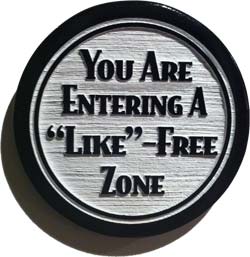
September 16, 2011

The whole thing reeks of insecurity. I remember back in college when a student was asked a question, they’d answer in this neurotic interrogative tone that rose about four octaves at the end. “I’m not sure, but, like—” they’d begin an answer to a Wuthering Heights question, “—I guess, like, Heathcliff loved Catherine?” Those last three words would go high enough to shatter a wine glass. Then we got older and realized we were right about a lot more stuff than we thought, so we confidently said, “It’s a love story” in a monotone. Be brave. Say: “He said, ‘There’s no way we are going to get across the river.’” I realize you don’t have a transcription of what he said. It’s a given that you’re paraphrasing. You don’t need to qualify it with a big fat “like” at the beginning, you pussy.
The word is a metastasized tumor that has invaded the lexicon and won’t stop until the entire language is dead. At first it meant, “This isn’t exactly what he said, but he said something similar to this”—as in, “So he was, like, ‘Get out of here,’ or whatever. I don’t remember exactly what he said.” Then it was used when the person didn’t have the vocabulary to express themselves, so they’d make a face or a sound after it—as in, “So they were, like…” (stupid face). Now they just stick it at the end of a sentence as they laugh—as in, “I mean, he, like, didn’t even have any forks! L-I-I-I-KE!” That last “like” is drawn out as the person chortles and it means, “Can you believe it?”
No, I can’t believe it. I can’t believe how idiotic everyone sounds. Don’t they understand that language is everything? If you can’t articulate what you want, you can’t get anything. I was discussing this with a fellow dad who is also battling to keep the word out of his home. He is a video director who does commercials, and he says he believes the most important subject in school is English. “Even with what I do,” he said, “I need to have the language at my disposal. If I’m bidding for a contract, I have to submit a proposal. If I sound as if I’m a babysitter, I’m not getting a check.”
 Initially, I thought the best way to handle this problem was to make everyone wear an electrified collar that gives you a short, sharp shock every time you say the word (even in the proper context—sorry—still working out the kinks).
Initially, I thought the best way to handle this problem was to make everyone wear an electrified collar that gives you a short, sharp shock every time you say the word (even in the proper context—sorry—still working out the kinks).
Unfortunately, I occasionally catch myself using this horrible word, so I was forced to be a little more gentle. How about a small black box you can clip to your lapel as if it were a broach? Every time you say “like,” it beeps and glows red. That’s it. I’ve already tried a prototype, and the results are disturbing. With friends, I will occasionally raise my finger every time they use the word in the wrong context. They are always shocked at how much they say it and inevitably reply, “I had no idea I use that word so much.” I have young interns at work, and it’s a much more serious problem for them, especially the girls. I have one 23-year-old intern who is only capable of not using the word when she holds her breath and speaks as slow as a robot.
I don’t know how we got here. I suspect the ubiquitous white trash of reality television brought this ridiculous habit from coast to coast and then shipped it overseas. Maybe it’s the entire dumbing-down of America and the can’t-be-fired teachers who would rather show movies than teach anything. I know my punitive beeping “Like Broach” will never catch on, so I’m left with one option—drawing a line around my house to make sure the four people under my roof are, like, aware of, like, how retarded you sound when you’re all, like, “like” all the time.